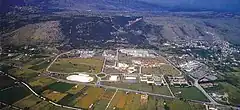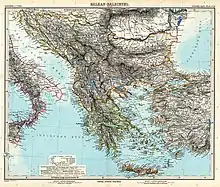University of Ioannina
The University of Ioannina (UoI; Greek: Πανεπιστήμιο Ιωαννίνων, Panepistimio Ioanninon) is a public university located in Ioannina, Greece. The university was founded in 1964, as a charter of the Aristotle University of Thessaloniki and became an independent university in 1970.[2]
Πανεπιστήμιο Ιωαννίνων | |
| Type | Public Higher Education Institution Greece University System |
|---|---|
| Established | 1964 – School of Philosophy 1970 – became independent from the Aristotle University |
| Chancellor | Batistatou K. Anna |
| Vice-Chancellor | Leonardos Ioannis Kanti Panagiota Matikas Theodoros Bitsikas Xenophon |
Total staff | 997[1] |
| Students | ~ 33,381 (active) [1] |
| Undergraduates | 30,401 (active) |
| Postgraduates | 1,328 |
| 1,652 | |
| Location | , , |
| Campus | 3.4 km² |
| Affiliations | Balkan Universities Network EASN |
| Website | www.uoi.gr |
 | |
As of 2017, there is a student population of 25,000 enrolled at the university (21,900 at the undergraduate level and 3,200 at the postgraduate level) and 580 faculty members, while teaching is further supplemented by 171 Teaching Fellows and 132 Technical Laboratory staff. The university Administrative Services are staffed with 420 employees.[3][4][5][6][7][8][9]
History
The efforts for the establishment of a University in Ioannina and in the wider area were apparent in the last years before the revolution. At that time, prominent Epirote intellectuals had attempted to establish University Schools in the Epirus region.[10] Since the 1950s there was a great need for the establishment of a university in the area that would validate the region's cultural significance and history. In 1962 a committee was established in Athens under the name "Central Committee for the establishment of a University in Ioannina" that fought for the particular goal. In a proclamation that they published in July 1962, they called for every citizen in the region to also fight for the cause.[10]
The change of government, which took place in 1964, passed a new law that changed the organization and administration of the faculties of the University of Ioannina. Within the framework of the educational reform, on May 8, 1964, the establishment of a Department of Philosophy in Ioannina was announced by the daily press, as a branch of the Aristotle University of Thessaloniki. The Department was founded and started its operation in the academic year 1964-65 with two hundred students.[11]
Campus


The campus is located 6 km from the centre of Ioannina and is one of the largest university campuses in Greece. It is linked to the town by Greek National Road 5 and can be reached from the city either by public transportation or by car.
It covers an area of almost 850 acres (3.4 km2) with many green open spaces which surround the four main building complexes.
The buildings cover an area of 170,000 m2, consisting of lecture halls, offices, laboratories, libraries, amphitheaters, etc. Large classes are held in auditoriums, while scientific meetings and exhibitions are held in the Conference Centre located in the Medical Sciences complex.
Two buildings accommodate the Student Residence Halls, both being close to the Student Union building; a multi-purpose building that houses the student restaurant and a large Hall of Ceremonies together with "Phegos"; a restaurant where the academic community and visitors can eat or celebrate special occasions, such as the graduation day.
One of the places on the campus is the old Monastery of Dourouti, an 18th-century building, which is being renovated to serve as a guest house for visitors to the university.
Schools and departments
As of 2017, the University of Ioannina consists of seven schools and fifteen departments.
| Schools | Departments |
|---|---|
| School of Philosophy |
|
| School of Science |
|
| School of Health Sciences |
|
| School of Engineering |
|
| School of Education |
|
| School of Economics and Business |
|
| School of Fine Arts |
|
| School of Social Sciences |
|
| School of Agriculture |
|
| School of Music |
|
| School of Informatics and Telecommunications |
|
Academic rankings
The University is ranked 501st-600th in The Times Higher Education (THE) annual list.[5]
According to the 2017 Leiden rankings the University of Ioannina is ranked #2 overall in Greece.[6][12]
According to the 2014 Leiden ranking of Greek Universities, the University of Ioannina is ranked #1 in Medicine and Life Sciences, #2 in Physics, #2 in Mathematics, #2 in Computer Science, #3 in Earth Sciences and #2 overall.[13]
According to 2010 rankings published in Springer's journal Scientometrics,[9] the Physics department at the University of Ioannina is ranked #2 in Greece, the Material Science department #3, and the Chemistry department #4.
Research institutes
Research indicators refer to any work published by the University of Ioannina on all scientific disciplines and to research projects launched through the UoI Special Research Fund.[14]
Ioannina Biomedical Research Institute
The Biomedical Research Institute (BRI) was founded in 1998. It operated as an autonomous institute until 2001, under the name Ioannina Biomedical Research Institute (IBRI).
From September 2001, the institute was merged with the Foundation for Research and Technology-Hellas (FORTH), and its new name is Foundation for Research and Technology-Hellas/Biomedical Research Institute.
BRI has three research directions: Molecular Medicine, Biomedical Technology, and Molecular Epidemiology. In order to fulfill the research aims the institute has established collaborations with the Medical School of the University of Ioannina, as well as with other departments of the university, the University Hospital, and the other institutes of FORTH.
Institute of Transportation & Telecommunications
The University of Ioannina has allied with the regional local authorities and industrial partners to establish an Institute of Transportation & Telecommunication in Igoumenitsa.
University Library and Information Centre
The University of Ioannina has the largest, in terms of effective surface area (14,500 sq. m. divided into six storeys), single library in Greece, which has been named the University of Ioannina Library and Information Centre.[15]
The equipment of the library includes 31 workstations, 504 reading stations, a 120-seat auditorium, an Art Gallery Exhibition Room, a Seminar Room with a seating capacity of 20 people, and 12 carrels.
Library users include all members of the academic community of the university and the public.
The library covers the fields of: Medicine, Chemistry, Physics, Biological Applications and Technologies, Materials Science and Engineering, Economics, Computer Science, Plastic Arts and Art Sciences, Primary and Pre-School Education, Philosophy, Education, and Psychology.
Student life
The university numbers today more than 25,000 students. Among them, there are approximately 21,900 undergraduate students. A number of organised postgraduate study programmes are on offer that combine taught and research elements both at Master's and Doctoral level. Approximately 1,500 students are involved in full-time study mode progressing to a master's degree, while more than 1,700 students are pursuing their studies at Doctoral level.[16]
Catering
The Student Refectory provides meals to all undergraduate and postgraduate students on a full-board (breakfast, lunch, dinner) daily basis. The refectory is located on campus and covers an area of 4,500 sq. m.
Accommodation
The Halls house almost 650 students on two sites, while a number of rooms have been adapted for disabled students. All accommodation is mixed, with a number of standard rooms (with shared bathroom facilities) or en suite rooms. The majority of rooms are single study-bedrooms although there are some shared rooms (two or three people).
Certain residences are reserved mainly for exchange students (i.e. Erasmus).
Erasmus programme
The University of Ioannina has exchange agreements with universities in mainland Europe through the Erasmus+ programme of the European Commission. The University of Ioannina welcomes foreign students who wish to expand their academic horizons by spending a semester or a year studying in Ioannina.[17]
See also
References
- "University in Numbers". University of Ioannina. Retrieved 2023-01-12.
- "University of Ioannina - History". www.uoi.gr. 2017-08-28.
- Hellenic Statistical Authority (EL.STAT.), Report on Higher Education - Students, Institutes and Faculty Staff (2013/2014), press release, November 2015 (Greek)
- "University of Ioannina in numbers". University of Ioannina. Retrieved 2016-02-03.
- "THE World University Rankings - University of Ioannina". Times Higher Education (THE). 2017-09-01.
- "CWTS Leiden Ranking - University of Ioannina". Centre for Science and Technology Studies of Leiden University. Retrieved 2017-01-09.
- UniversityRankings.ch (SERI) 2015 - University of Ioannina Retrieved in 2016-02-03.
- "Ranking Web of Universities". Webometrics.
- Lazaridis, Themis (2010). "Ranking university departments using the mean h-index". Scientometrics. 82 (2): 211–216. doi:10.1007/s11192-009-0048-4. S2CID 10887922.
- "Ιστορική αναδρομή" uoi.gr. Retrieved in 2021-03-13.
- (November 30, 1964)«ΦΕΚ A 240/1964».(PDF) Εφημερίς της Κυβερνήσεως. p. 1-2. Retrieved 2021-03-13
- "Leiden Ranking 2016: University of Ioannina ranked 2nd in Greece". University of Ioannina. Archived from the original on 2016-02-03. Retrieved 2016-02-03.
- Studies (CWTS), Centre for Science and Technology. "CWTS Leiden Ranking". CWTS Leiden Ranking. Retrieved 2019-10-19.
- "University of Ioannina Research". www.uoi.gr. 2017-08-28.
- "University of Ioannina - Library". www.lib.uoi.gr/. 2017-08-28.
- "University of Ioannina - Students". www.uoi.gr. 2017-08-28.
- "University of Ioannina - Erasmus+". www.uoi.gr. 2017-08-28.

_Ca'_Foscari.jpg.webp)

.JPG.webp)